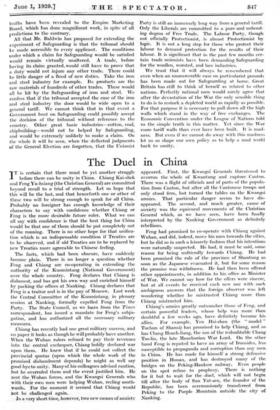The Duel in China
IT is certain that there must be yet another struggle before there can be unity in China. Chiang Kai-shek and Feng Yu-hsiang (the Christian General) are committed beyond recall to a trial of strength. Let us hope that this will be the last, and that henceforth one or other of these two will be strong enough to speak for all China. Probably no foreigner has enough knowledge of their characters to say with confidence whether Chiang or Feng is the more desirable future ruler. What we can all say with confidence is that the best thing for China would be that one of them should be put completely out of the running. There is no other hope for that unifica- tion which is an indispensable condition if Treaties are to be observed, and if old Treaties are to be replaced by new Treaties more agreeable to Chinese feeling.
The facts, which had been obscure, have suddenly become plain. There is no longer a question whether Feng and Chiang are co-operating in extending the authority of the Kuomintang (National Government) over the whole country. Feng declares that Chiang is dishonest, and has got his own way and enriched himself by packing the offices at Nanking. Chiang declares that Feng is a traitor and is in the pay of Moscow. Last week the Central Committee of the Kuomintang, in plenary session at Nanking, formally expelled Feng from the Party. The State Council, as we learn from the Times correspondent, has issued a mandate for Feng's subju- gation, and has authorized all the necessary military measures.
• _Chiang has recently had one great military success, and on paper it looks as though he will probably have another. When the Wuhan rulers refused to pay their revenues into the central exchequer, Chiang boldly declared war upon them. He knew that if he could not collect the provincial quotas (upon which the whole work of the promised disbandment depends) he might as well say good-bye to unity. Many of his colleagues advised caution, but he overruled them and the event justified him. He Sent the Wuhan forces, and the Kwangsi Generals who with their own men were helping Wuhan, reeling south- wards. For the moment it seemed that Chiang would not be challenged again.
In a very short time, however, two new causes of anxiety appeared. First, the Kwangsi Generals threatened to overrun the whole of Kwantung and capture Canton. There was a flight of officials and of parts of the popula- tion from Canton, but after all the Cantonese troops not only stood firm, but turned the tables on the Kwangsi armies. That particular danger seems to have dis- appeared. The second, and much greater, cause of anxiety was the equivocal movements of the Christian General which, as we have seen, have been finally interpreted by the Nanking Government as definitely rebellious.
Feng had promised to co-operate with Chiang against Wuhan, and did, indeed, move his men towards the cities, but he did so in such a leisurely fashion that his intentions were naturally suspected. He had, it must be said, some reason for being unfriendly towards Chiang. He had been promised the rule of the province of Shantung as soon as the Japanese evacuated it, but for some reason the promise was withdrawn. He had then been offered other appointments, in addition to his office as Minister of War. We cannot say how far the offers were sincere, but at all events he received each new one with such ambiguous answers that the foreign observer was left wondering whether he mistrusted Chiang more than Chiang mistrusted him.
Chiang's armies greatly outnumber those of Feng, and certain powerful leaders, whose help was more than doubtful a few weeks ago, have definitely become his allies. For example, Yen Hsi-shan (the " model " Tuchun of Shansi) has promised to help Chiang, and so has Chang Hsueh-liang, the son of the redoubtable Chang Tso-lin, the late Manchurian War Lord. On the other hand Feng is reputed to have an army of Ironsides, less susceptible to propaganda and corruption than any men in China. He has made for himself a strong defensive position in Honan, and has destroyed many of the bridges on the Peking-Hankow railway. Even people on the spot refuse to prophesy. There is nothing for it but to wait for the duel, which will not begin till after the body of Sun Yat-sen, the founder of the Republic, has been ceremoniously transferred from Peking to the Purple Mountain outside the city of Nanking.










































 Previous page
Previous page